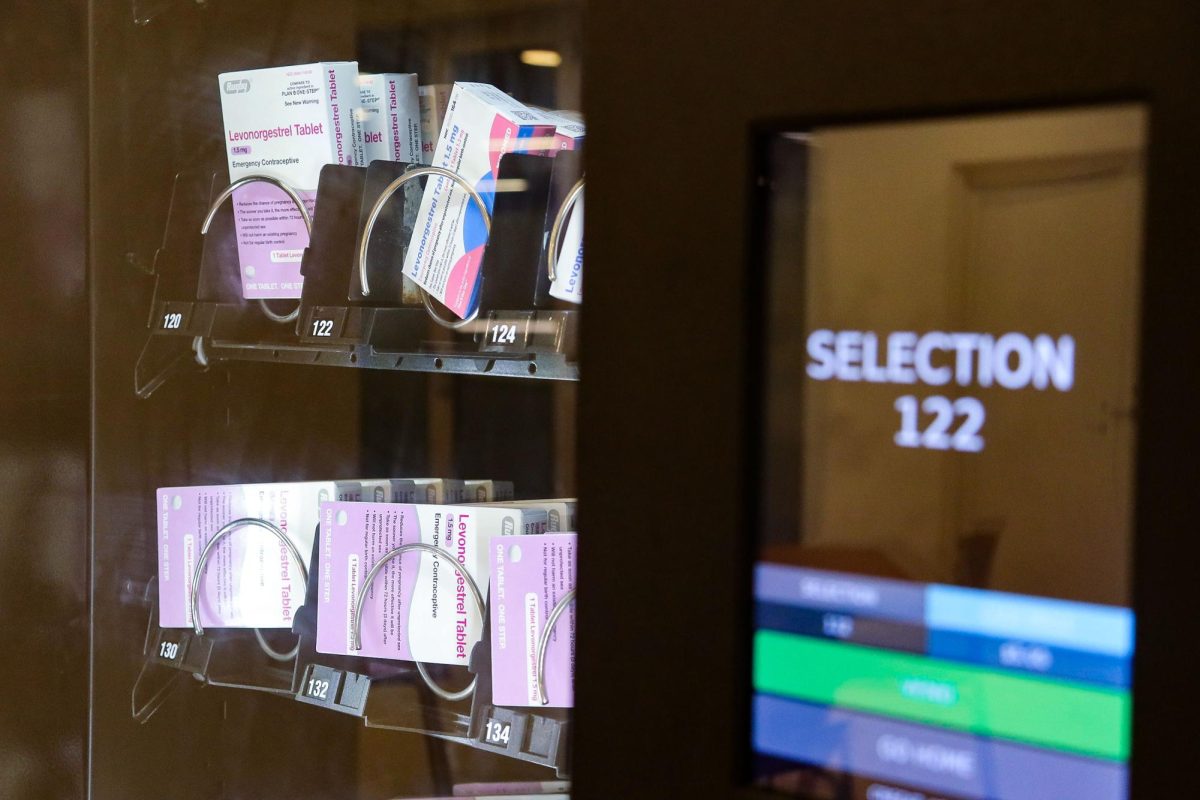On-campus Plan B vending machine prices decreased to $5 following constant efforts from student groups to make emergency contraceptives more accessible for GW students.
Stephanie Spector, the president of GW Reproductive, Autonomy and Gender Equity, said the prices decreased from $15 to $5 after former SGA President Arielle Geismar gave RAGE the remainder of her executive budget at the end of last semester to put toward purchasing Plan B for the vending machines. The cost reduction is the latest step from students working to increase affordable access to emergency contraceptives and other sexual health resources almost five years after Foggy Bottom Plan B, an off-campus and student run organization, started providing free Plan B for the Foggy Bottom and GW community.
Spector said during the summer, the vending machine price was $1 for the emergency contraceptives, but RAGE decided to increase the price to $5 because most students can afford the contraceptive, and the price is sustainable for the organization to maintain.
“There are also, of course, other ways to get free Plan B in the area,” Spector said. “So we’re hoping that if $5 still is a barrier for folks, they’ll turn to Foggy Bottom Plan B, which RAGE is very involved in, where they can get free Plan B as well.”
SGA and RAGE said in an Instagram post that the pricing may change in the future when RAGE finds a new supplier for the machine.
Officials installed a vending machine in the University Student Center stocked with Plan B in January 2023 for $25 and later replaced it with two new machines in District House and West Hall, lowering the cost to $15 in collaboration with the SGA and RAGE in August 2023.
RAGE announced in July that Canteen, the company that stocks the Plan B vending machine, will no longer be stocking nonfood items. Spector said the Student Health Center currently purchases generic emergency contraceptives from the Medical Faculty Associates and that GW Business Services are stocking the machines until they find a new supplier.
EJ Tennant, the co-president of Foggy Bottom Plan B, said the organization used to purchase the contraceptives themselves when it first formed in 2019 and relied on individual monetary donations from students who requested Plan B from them to fund their stock. She said the organization now has connections with organizations like Advocates for Youth, and Julie, a healthcare brand that provides emergency contraceptives, so they no longer have to purchase their supplies thanks to donations from their partners.
She said students who request Plan B are required to sign a waiver that acknowledges they are receiving an emergency contraceptive from students and not from a doctor or medical service.
Tennant said the Dobbs v. Jackson decision that overturned the landmark case Roe v. Wade that federally protected abortion access makes it difficult for students to access abortion services in their home states. She said the SHC does not provide medical or surgical abortion and refers students to the DC Planned Parenthood, which is about 30 minutes from campus via public transportation.
“Access to all health care is important to the well-being and success of students at GW,” Tennant said in a message. “The University needs to prioritize achieving access to all reproductive health care services for students so DC can continue to provide abortion and reproductive health services for its residents and neighboring states.”
She said the amount of requests the group received has decreased since the establishment of Plan B vending machines on campus but still maintains a “steady flow” of distribution because their Plan B is free. She said the organization has expanded their outreach across the GW and Foggy Bottom communities by increasing their social media presence and maintaining their website to be a consistent resource for the Foggy Bottom community.
Tennant said the group has repeatedly applied to become a registered organization on campus since it was formed in 2019, but officials rejected their most recent application in spring 2022. Tennant said she thinks officials don’t want the “responsibility” of students giving out free emergency contraceptives without a prescription or doctors’ approval.
A University spokesperson said Foggy Bottom Plan B was denied as an official student organization because the Office of Student Life could not verify how the organization obtained the contraceptives that they were going to distribute. They added that officials had concerns about improper storage temperatures, expired medication and the lack of a medical professional’s consultation, which also led to the decision to deny their application.
“I would hope that one day it could become an organization on campus just to have that longevity aspect of, like, ‘It’s not going to go away, you’re never going to be without access,’” Tennant said. “But I don’t see it happening anytime soon.”
The University spokesperson said the SHC is able to prescribe emergency contraceptives when a student has an appointment and is covered under “most” insurances, including the GW Student Health Insurance Plan. They added that the SHC has to complete a medical assessment before recommending any medication that is prescribed or over the counter.
“The Student Health Center has an obligation to assess each student individually prior to recommending any medication whether it be over the counter or prescription,” the spokesperson said.
The SGA unanimously passed a bill requesting the University to provide medication abortion, an abortion method that involves taking mifepristone and misoprostol to terminate a pregnancy, in the SHC for students at the lowest possible cost last spring. Officials rejected RAGE’s original request for the SHC to stock abortion pills last fall citing the SHC’s resources like contraceptive pills, rings, patches and injections and that the SHC added a gynecological health specialist.








